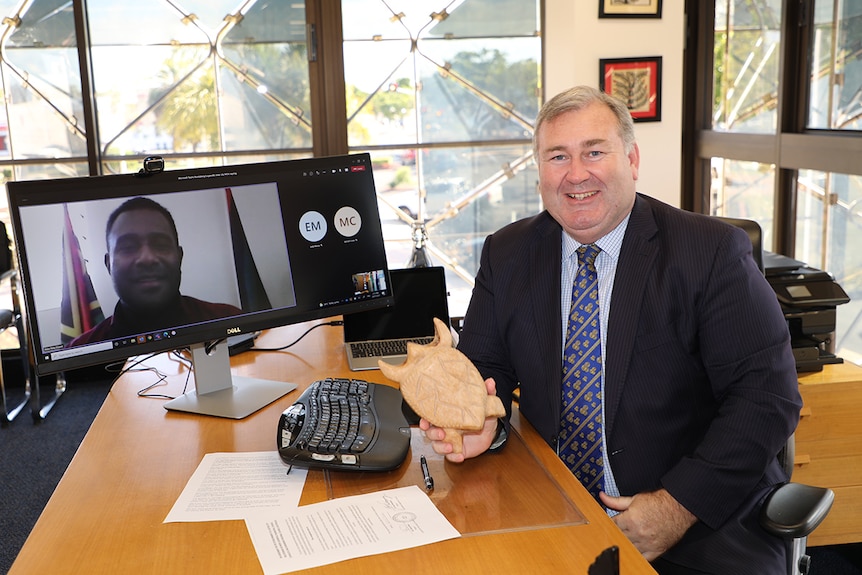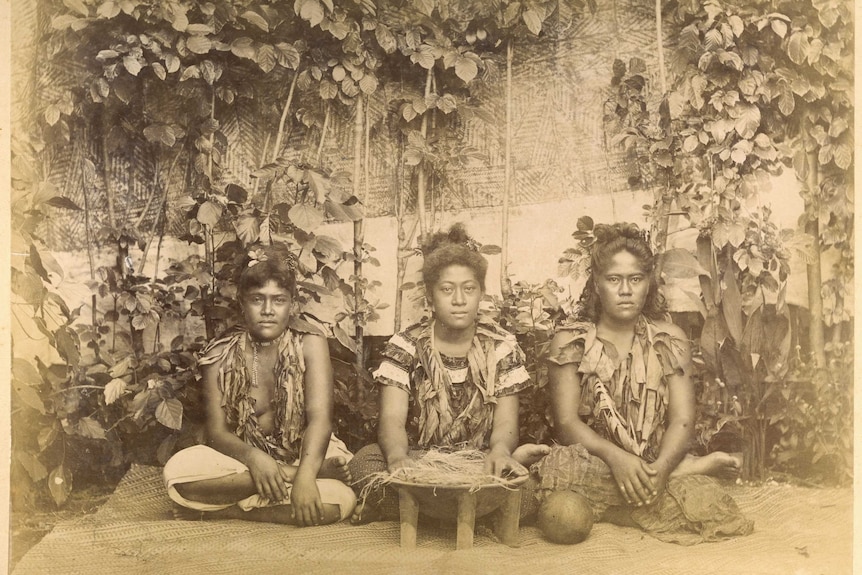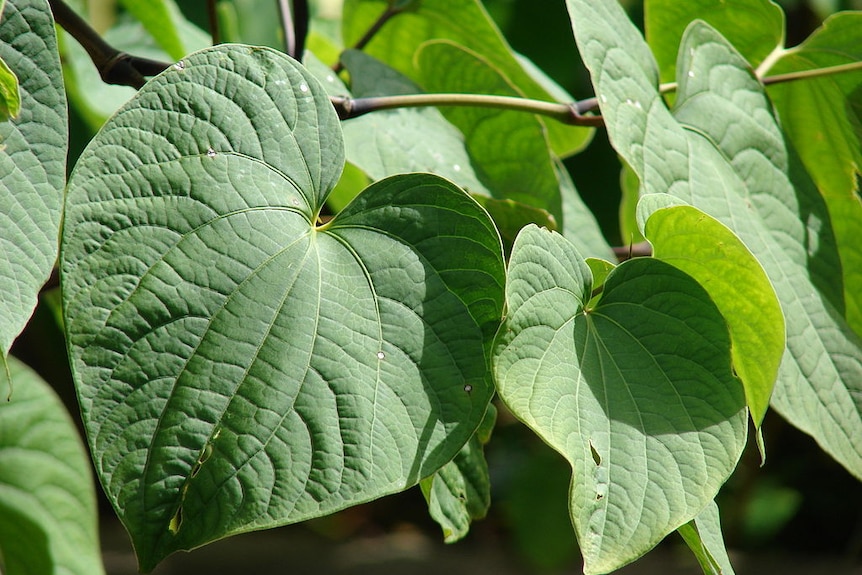News Article Legalizing and Farming Kava in Australia.
- Thread starter Groggy
- Start date
"A local government in Queensland is seeking to grow a crop that has been banned in Australia for more than 20 years as it is considered a drug.
Key points:
Vanuatu Kava Industry Association chairman Michael Louze said he was shocked.
"I was a bit disgusted because Australia has banned kava for more than 15 years and just to say they're going to grow it now, when it's becoming the major source of income for small farmers in the South Pacific, it's very hypocritical," he said.
"We're looking for innovation and science for how we can value add," he said.
"I think as the conversation with kava expands and how we can support the islands we can actually be of assistance to them."
The idea was formed as the council enters into a sister city arrangement with Luganville in Vanuatu.
 Luganville Mayor Peter Patty and Bundaberg Mayor Jack Dempsey have signed a Sister City agreement.(Supplied: Bundaberg Regional Council)Cultural importance
Luganville Mayor Peter Patty and Bundaberg Mayor Jack Dempsey have signed a Sister City agreement.(Supplied: Bundaberg Regional Council)Cultural importance
Kava is considered an essential part of traditional ceremonies for Pacific Island communities.
Vanuatu's High Commissioner to Australia Samson Fare said it is used during events like weddings and funerals.
It's also consumed socially around the world according to Mr Louze.
"We have a growing market in New Zealand - you go to downtown Auckland and you have kava bars where you can enjoy kava at night," he said.
"There's 200 to 250 kava bars in the United States and many other places."
 Kava is a traditional drink consumed by Pacific Island communities socially and during ceremonies. Photographed by an unknown photographer in about 1890.(Commons)
Kava is a traditional drink consumed by Pacific Island communities socially and during ceremonies. Photographed by an unknown photographer in about 1890.(Commons)
Mr Louze said while he was angered by the Council's announcement, he does hope this could help Australia learn more about kava.
'Feels like it's a never ending story'
Australia banned imports more than 20 years ago due to the drink being abused in some remote Indigenous communities.
The federal government announced a small trial of commercial imports last year which has been postponed until the end of 2021.
 The traditional beverage is made by crushing the roots and rhizome of the kava plant and mixing it with water.(Commons: Hsz282)
The traditional beverage is made by crushing the roots and rhizome of the kava plant and mixing it with water.(Commons: Hsz282)
It has also increased the amount people can bring into the country for personal use from 2 to 4 kilograms.
Mr Louze said they were not confident the trial would go ahead.
"There has been talk about removing the ban for kava in Australia for so many years," he said.
Mr Dempsey said growing it in Australia could help increase the amount of kava on the world market.
"There is a limitation in space within those particular islands," he said.
"The market is growing worldwide and they are looking for places and secure markets to be able to have a benefit for their home nations."
Mr Fare said Vanuatu and other Pacific Island countries were not suffering shortfalls in production
"If Australia would open the market there would be enough product to be exported here," he said.
"In order to be able to export kava to the Australian market under the commercial pilot we have to do a lot of work."

The leaves of the kava plant are crushed, releasing chemicals with a sedative effect.(Commons: Forest and Kim Starr)
Mr Louze said he's doubtful it could be successfully grown in Australia anyway.
He said kava would put even more pressure on the agriculture industry's worker shortage
"Australia already has many labour issues, they have to import labour from the Pacific," Mr Louze said.
"Kava is labour intensive. You can talk about mechanisation, but America has tried it and so far they've had very little success."
Key points:
- A Queensland local government wants to trial kava production
- Kava imports were banned 20 years ago and can't be purchased in Australia
- The federal government announced a trial to import kava into Australia
Vanuatu Kava Industry Association chairman Michael Louze said he was shocked.
"I was a bit disgusted because Australia has banned kava for more than 15 years and just to say they're going to grow it now, when it's becoming the major source of income for small farmers in the South Pacific, it's very hypocritical," he said.
But BRC Mayor Jack Dempsey said they wanted to work with these communities."Australia considers kava a drug and now they're saying they want to plant it."
"We're looking for innovation and science for how we can value add," he said.
"I think as the conversation with kava expands and how we can support the islands we can actually be of assistance to them."
The idea was formed as the council enters into a sister city arrangement with Luganville in Vanuatu.
Kava is considered an essential part of traditional ceremonies for Pacific Island communities.
Vanuatu's High Commissioner to Australia Samson Fare said it is used during events like weddings and funerals.
The traditional beverage is made by crushing the roots and rhizome of the kava plant and mixing it with water."It brings people to come and sit together around kava to drink and to talk."
It's also consumed socially around the world according to Mr Louze.
"We have a growing market in New Zealand - you go to downtown Auckland and you have kava bars where you can enjoy kava at night," he said.
"There's 200 to 250 kava bars in the United States and many other places."
Mr Louze said while he was angered by the Council's announcement, he does hope this could help Australia learn more about kava.
"There are people who need their coffee in the morning to have a bit of a boost. Australians will realise it's the same with kava — you have a kava in the afternoon to relax.""Kava is perfectly safe to consume daily, same as tea, same as coffee, same as cocoa," he said.
'Feels like it's a never ending story'
Australia banned imports more than 20 years ago due to the drink being abused in some remote Indigenous communities.
The federal government announced a small trial of commercial imports last year which has been postponed until the end of 2021.
It has also increased the amount people can bring into the country for personal use from 2 to 4 kilograms.
Mr Louze said they were not confident the trial would go ahead.
"There has been talk about removing the ban for kava in Australia for so many years," he said.
'It's not a one year crop'"It feels like it's a never ending story. It's not happening and we don't know if it's going to happen ever."
Mr Dempsey said growing it in Australia could help increase the amount of kava on the world market.
"There is a limitation in space within those particular islands," he said.
"The market is growing worldwide and they are looking for places and secure markets to be able to have a benefit for their home nations."
Mr Fare said Vanuatu and other Pacific Island countries were not suffering shortfalls in production
"If Australia would open the market there would be enough product to be exported here," he said.
"In order to be able to export kava to the Australian market under the commercial pilot we have to do a lot of work."
Mr Louze said he's doubtful it could be successfully grown in Australia anyway.
"It's not a one-year crop, it's a minimum of 3 to 4 years before you can harvest it," Mr Louze said."The weather, the soil would be totally different, so it would not be easy," he said.
He said kava would put even more pressure on the agriculture industry's worker shortage
"Australia already has many labour issues, they have to import labour from the Pacific," Mr Louze said.
"Kava is labour intensive. You can talk about mechanisation, but America has tried it and so far they've had very little success."
Last edited:
Seeing as most of the South Pacific has a negative stance on this....I'd wager they'll probably be coming to you for that material.Yes, quite surprising, and no mention of where they might be looking for plant material.
Aceofwands9
Kava Enthusiast
I really think if you farm a plant you should pay royalties to its traditional caregivers in its homeland. Would help solve many of the lingering and present problems of imperialism.
Henry
.
Most of the plants from developing countries are grown in other developing countries. E.g. coffee, cocoa, bananas, coconuts etc. Not sure how making farmers in Ghana pay royalties to Central American governments (or Tanna coffee farmers pay royalties to the government of Ethiopia) solves any issues.I really think if you farm a plant you should pay royalties to its traditional caregivers in its homeland. Would help solve many of the lingering and present problems of imperialism.
Aceofwands9
Kava Enthusiast
That's a good point, but think about cannabis for example. A lot of the taxable cannabis being grown is in developed countries and I would feel better about buying it if I knew an 'heirloom tax' I paid on domestically grown cannabis went to places like India, Afghanistan, and PakistanMost of the plants from developing countries are grown in other developing countries. E.g. coffee, cocoa, bananas, coconuts etc. Not sure how making farmers in Ghana pay royalties to Central American governments (or Tanna coffee farmers pay royalties to the government of Ethiopia) solves any issues.
Most of these secondary farmers already have access to whichever crop they are growing, the same cannot be said for kava. I think kava belongs where it is grown naturally. Australia should put that idea on the backburner until they legalize kava in Australia beyond a trial run.Most of the plants from developing countries are grown in other developing countries. E.g. coffee, cocoa, bananas, coconuts etc. Not sure how making farmers in Ghana pay royalties to Central American governments (or Tanna coffee farmers pay royalties to the government of Ethiopia) solves any issues.
Henry
.
I was just commenting on the idea that "you farm a plant you should pay royalties to its traditional caregivers in its homeland". My comment was unrelated to the Australian kava idea (which I agree is insulting considering the ban on imports)Most of these secondary farmers already have access to whichever crop they are growing, the same cannot be said for kava. I think kava belongs where it is grown naturally. Australia should put that idea on the backburner until they legalize kava in Australia beyond a trial run.
Henry
.
I don't think many weed growers/smokers in America would like to pay a tax to the current Afghani administration every time they roll up a joint lolThat's a good point, but think about cannabis for example. A lot of the taxable cannabis being grown is in developed countries and I would feel better about buying it if I knew an 'heirloom tax' I paid on domestically grown cannabis went to places like India, Afghanistan, and Pakistan
Aceofwands9
Kava Enthusiast
Well I meant more a hypothetical tax paid directly to farm programs for things like increased land race cultivation and funding the role traditional wisdom in its farming.
